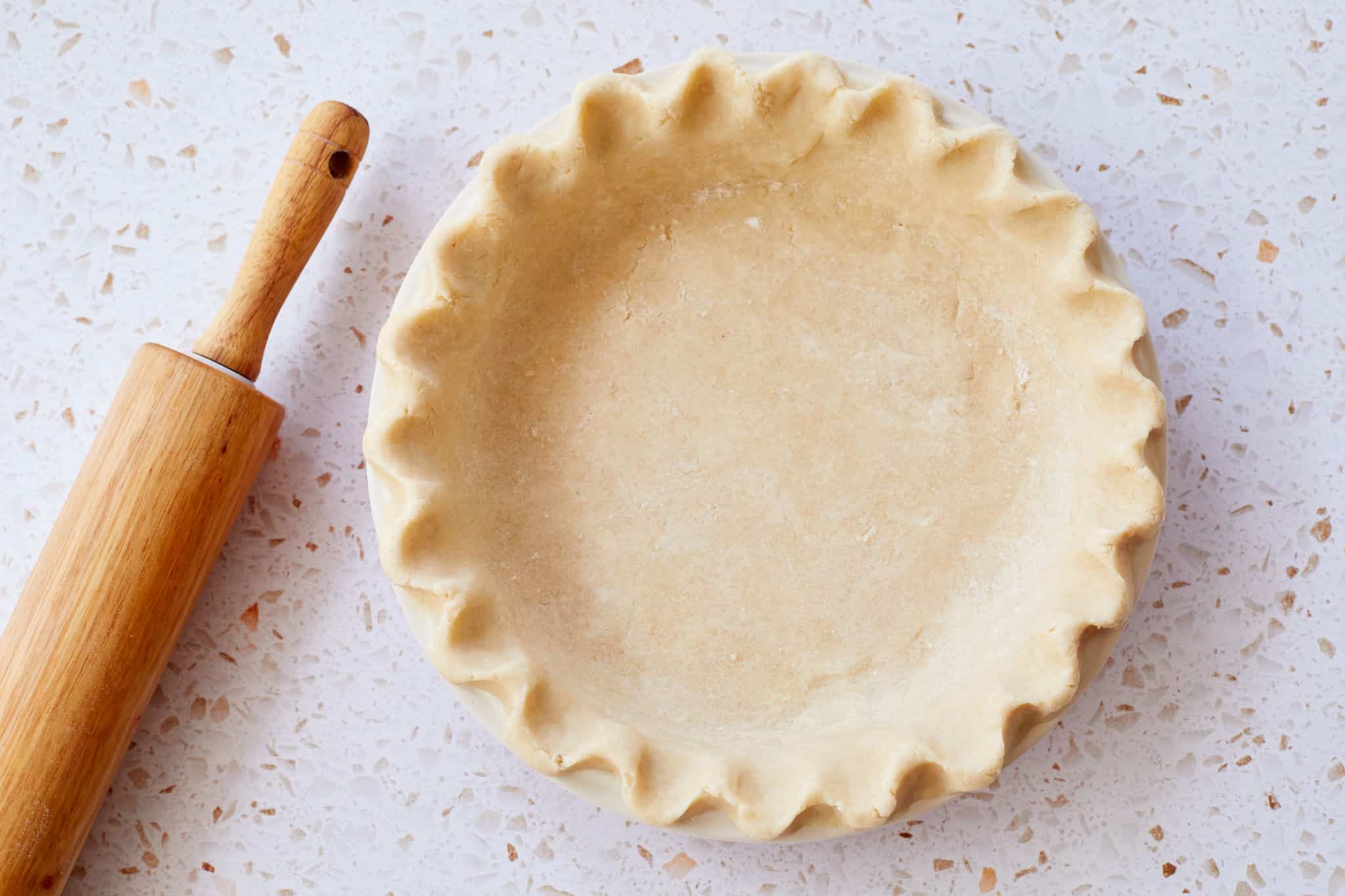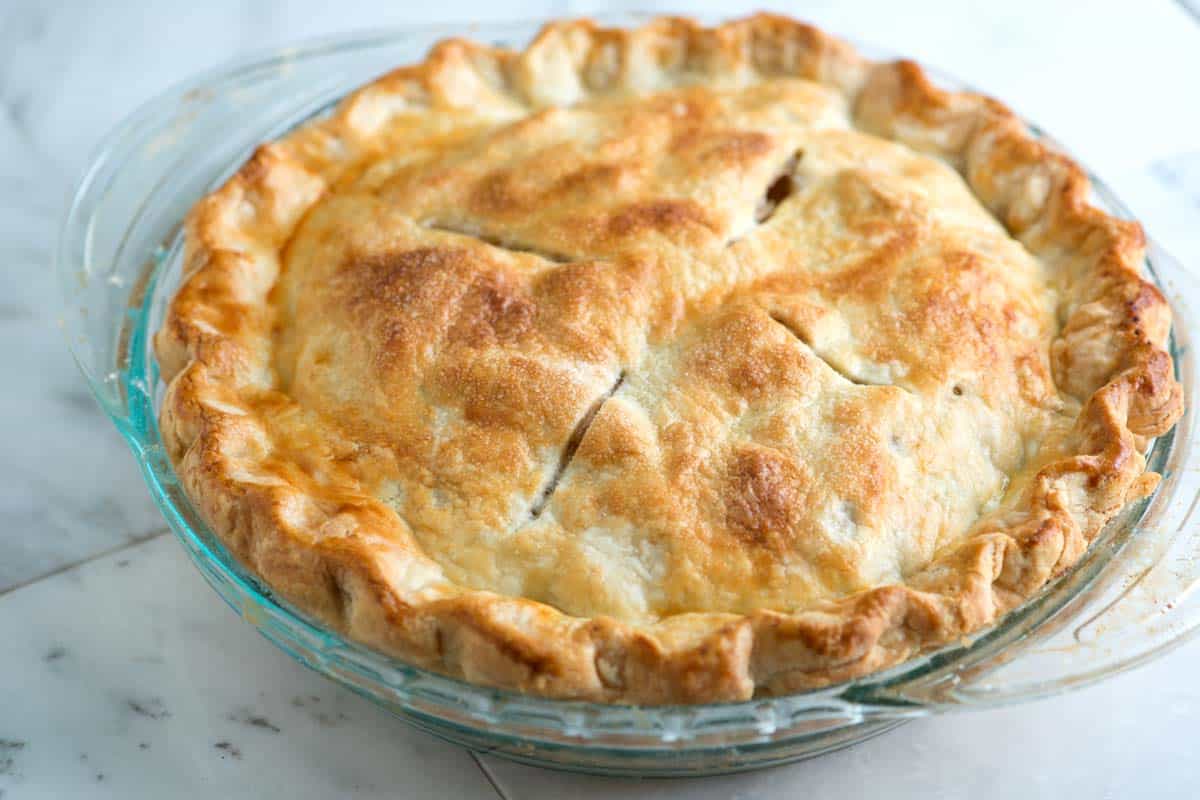
Easy All-Butter Flaky Pie Crust

This pie crust recipe makes consistent dough and makes dough that’s a dream to roll out. Using a food processor in this recipe eliminates variability. If you have one, use it. With that said, you can do this method by hand. Directions are provided below for using a processor and by hand.
Prep: 1h15min
Total: 1h15min
Yield: Enough for one 9-inch double crust pie
Serving Size: 1/8 of dough
Nutrition Facts: servingSize 1/8 of dough, calories 345, Protein 4 g, Carbohydrate 30 g, Fiber 1 g, Sugar 0 g, Fat 23 g, Saturated Fat 15 g, Cholesterol 61 mg
Ingredients:
- 2 ½ cups (325 grams) all-purpose flour
- 1 teaspoon kosher salt or use 1/2 teaspoon fine sea salt
- 1 tablespoon sugar, optional
- 1 cup (230 grams) very cold unsalted butter, cut into 1/2-inch cubes (2 sticks)
- 4 to 8 tablespoons ice water
Instruction:
- Add 1 ½ cups flour, salt, and sugar (optional) to a food processor. Pulse 2 to 3 times until combined. The remaining cup of flour will be added later.
- Scatter butter cubes over flour and process until a dough or paste begins to form, about 15 seconds. (There should be no uncoated flour).
- Scrape bowl, redistribute the flour-butter mixture then add remaining 1 cup of flour. Pulse 4 to 5 times until flour is evenly distributed. (Dough should look broken up and a little crumbly).
- Transfer to a medium bowl then sprinkle ice water over mixture — start with 4 tablespoons and add from there. Using a rubber spatula, press the dough into itself. The crumbs should begin to form larger clusters. If you pinch some of the dough and it holds together, it’s ready. If the dough falls apart, add 2 to 4 more tablespoons of water and continue to press until dough comes together.
- Remove dough from bowl and place in a mound on a clean surface. Work the dough just enough to form a ball. Cut the ball in half then form each half into discs. Wrap each disc with plastic wrap and refrigerate for at least 1 hour and up to 2 days. You can also freeze it for up to 3 months (just thaw it overnight in the fridge before using it).
- Add 1 1/2 cups flour, salt and sugar (optional) to a medium bowl. Stir 2 to 3 times until combined.
- Scatter butter cubes over flour and mix briefly with a fork or spatula to coat the butter with flour.
- Cut the butter into the flour with a pastry blender, working mixture until the flour has a coarse, mealy texture similar to fresh bread crumbs. About 1 – 2 minutes.
- Add remaining 1 cup of flour. Work butter and flour with the pastry blender until flour is evenly distributed. About 20 seconds. (Dough should look crumbly with pea-sized pieces).
- Sprinkle ice water over the mixture — start with 4 tablespoons and add from there. Using a rubber spatula, press the dough into itself. The crumbs should begin to form larger clusters. If you pinch some of the dough and it holds together, it’s ready. If the dough falls apart, add 2 to 4 more tablespoons of water and continue to press until dough comes together.
- Remove dough from bowl and place in a mound on a clean surface. Work the dough just enough to form a ball. Cut ball in half then form each half into discs. Wrap each disc with plastic wrap and refrigerate at least 1 hour, and up to 2 days. You can also freeze it for up to 3 months (just thaw it overnight in the fridge before using).
- Remove one of the dough discs from the refrigerator and let sit at room temperature for 5 minutes.
- Lightly flour work surface, top of dough and rolling pin. Then use rolling pin to roll out dough to a 12-inch circle (about 1/8-inch thick). Be sure to check if the dough is sticking to the surface below — add a small amount of flour when necessary.
- Check for size by inverting pie dish over dough round. Look for a 1-inch edge around the pie dish. To transfer dough to dish, starting at one end, roll dough around rolling pin then unroll over dish.
- Gently press dough down into dish so that it lines the bottom and sides of the dish. (Be careful not to pull or stretch the dough). Then, use a knife or pair of kitchen scissors to trim dough to within 1/2-inch of the edge of the dish.
- Fold edge of dough underneath itself so that it creates a thicker, 1/4-inch border that rests on the lip of the dish. Then, crimp edges by pressing the pointer finger of one hand against the edge of the dough from the inside of the dish while gently pressing with two knuckles of the other hand from the outside. Refrigerate dough at least 20 minutes or freeze for 5 minutes before baking.
- If making a double crust pie, do not crimp edges yet. Roll out second dough disc, fill pie then top with second dough round. Trim the edges then crimp.
- Heat the oven to 425 degrees F. Place a baking sheet on a middle oven rack.
- Roll out enough dough to make one 9-inch crust (1 dough disk). Place into a pie plate and then pierce the bottom of the crust with a fork (this prevent air pockets or bubbles from forming while baking). Line the crust with two sheets of aluminum foil or parchment paper. (Be sure to push foil against the edges of the crust). Then, fill foil with dried rice, dried beans or pie weights. Refrigerate 30 minutes or freeze for 10 minutes, or until firm to the touch.
- Place pie crust onto preheated baking sheet and reduce oven temperature to 400 degrees F. Bake 20 to 30 minutes or until the crust is golden.
- Make an egg wash by whisking one egg yolk and 1 tablespoon of cream in a small bowl. Then, remove rice, beans or pie weights and foil from pie crust. Brush the bottom and sides of the crust with egg wash. Bake until egg wash is dry and shiny, 3 to 5 minutes. Cool crust completely before filling.
- Oven temperature and bake time for double crust pies will vary depending on the pie recipe you plan to follow. As an example, we set our oven to 400 degrees Fahrenheit for our double crust cherry pie (see the recipe here).
- Remove half of dough from refrigerator and let sit at room temperature for 5 minutes. On a lightly floured surface, roll out dough to a 13-inch (1/8-inch thick) circle.
- Check for size by inverting pie dish over dough round. Look for a 1-inch edge around the pie dish. Carefully press the dough into the dish. Spoon the pie filling into pie crust.
- Roll out second half of dough then top pie. Use a knife or pair of kitchen scissors to trim dough to within 3/4-inch of the edge of the dish.
- Fold edges of top crust underneath edges of bottom crust, pressing the edge to seal it so that it creates a thicker, 1/4-inch border that rests on the lip of the dish. Then, crimp edges by pressing the pointer finger of one hand against the edge of the dough from the inside of the dish while gently pressing with two knuckles of the other hand from the outside. Refrigerate pie at least 20 minutes or freeze for 5 minutes before baking.
- Just before baking, make egg wash by whisking egg yolk and cream together in a small bowl. Use a pastry brush to brush over the top crust. Then, sprinkle with 1 tablespoon of sugar. Then, cut 3 to 4 slits in top of pie. Bake as directed by the specific recipe you are following.
How to Make Pie Crust
FAQ
What is the secret to making amazing pie dough?
- Keep the Butter Cold. …
- Use Your Fridge To Keep Other Ingredients Cold. …
- Chill Thoroughly. …
- Handle Dough Gently. …
- Evenly Distribute Butter. …
- Roll Dough Away From You. …
- Don’t Knead Too Much. …
- Don’t Be Afraid To Leave Crumbles.
What are the 3 types of pie dough?
What are the two types of pie dough?
There are two types of textures to pie dough: flaky and mealy, always being tender, depending on how the fat is blended in with the flour and its temperature.
Is pie crust better with Crisco or butter?
